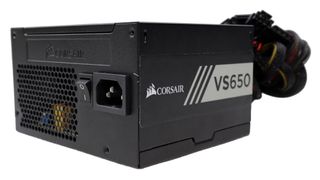Corsair VS650 Power Supply Review: Affordable Yet Capable
Why you can trust Tom's Hardware
Bottom Line
Every brand has to take into account users that need a super-affordable power supply and have a series of corresponding products that tick all the boxes in this section. Corsair's VS line covers a large wattage range with all of its members having low price tags. Even the strongest VS with 650W max power can be found for less than 50 bucks or pounds in the US and UK markets, respectively. For plain office PCs or even mid-range gaming PCs, where the power requirements are low, a VS unit could be a good choice. Nonetheless, in my opinion, you should use high efficiency power supplies to minimize your carbon footprint and protect the environment.
I know that there is a notable price difference between the VS650 and higher efficiency models, but if you make a good choice you will most likely utilize the PSU for many years to come so in the long run you will save money on electricity bills. Moreover, higher efficiency units output lower noise, in the majority of cases at least, and noise pollution is a serious issue. Several years ago most users didn't care so much about the noise levels of their systems, but thankfully this is not the case any more pushing most brands to also care about the output noise of their products.

The 85°C bulk cap along with the Teapo SC caps in the secondary side and the sleeve bearing fan won't last for ages, but you shouldn't expect for miracles from such an affordable unit. If you want something that will be operational for at least five years then you should spend more and get an efficient unit, equipped with higher quality caps and a FDB or double-ball bearing fan.
The VS650 is a decent product, given its low price tag, with one of its strong advantages being that it is covered by a three-year warranty, and in my experience Corsair after sales support is good. In order to lower the production cost an older design was utilized, so the performance is mediocre and the same goes for the efficiency, but at least the product looks to be reliable since it survived all of my tough tests without breaking, although I cranked up the heat inside my hot box during the 10-110% load tests. Finally, the majority of protection features are properly configured but this doesn't seem to be the case for the over current protection at +12V, which allows this rail to drop very low, close to 11V. Such low voltages apply increased stress to the DC-DC converters of all system components and this is why the ATX spec sets 11.4V, as the lowest acceptable level for the +12V rail.
Image Credits: Tom's Hardware
MORE: Best Power Supplies
MORE: How We Test Power Supplies
MORE: All Power Supply Content
Disclaimer: Aris Mpitziopoulos is Tom's Hardware's PSU reviewer. He is also the Chief Testing Engineer of Cybenetics, and developed the Cybenetics certification methodologies apart from his role on Tom's Hardware. Neither Tom's Hardware nor its parent company, Future PLC, are financially involved with Cybenetics. Aris does not perform the actual certifications for Cybenetics.
Stay on the Cutting Edge
Join the experts who read Tom's Hardware for the inside track on enthusiast PC tech news — and have for over 25 years. We'll send breaking news and in-depth reviews of CPUs, GPUs, AI, maker hardware and more straight to your inbox.
Aris Mpitziopoulos is a Contributing Editor at Tom's Hardware US, covering PSUs.
